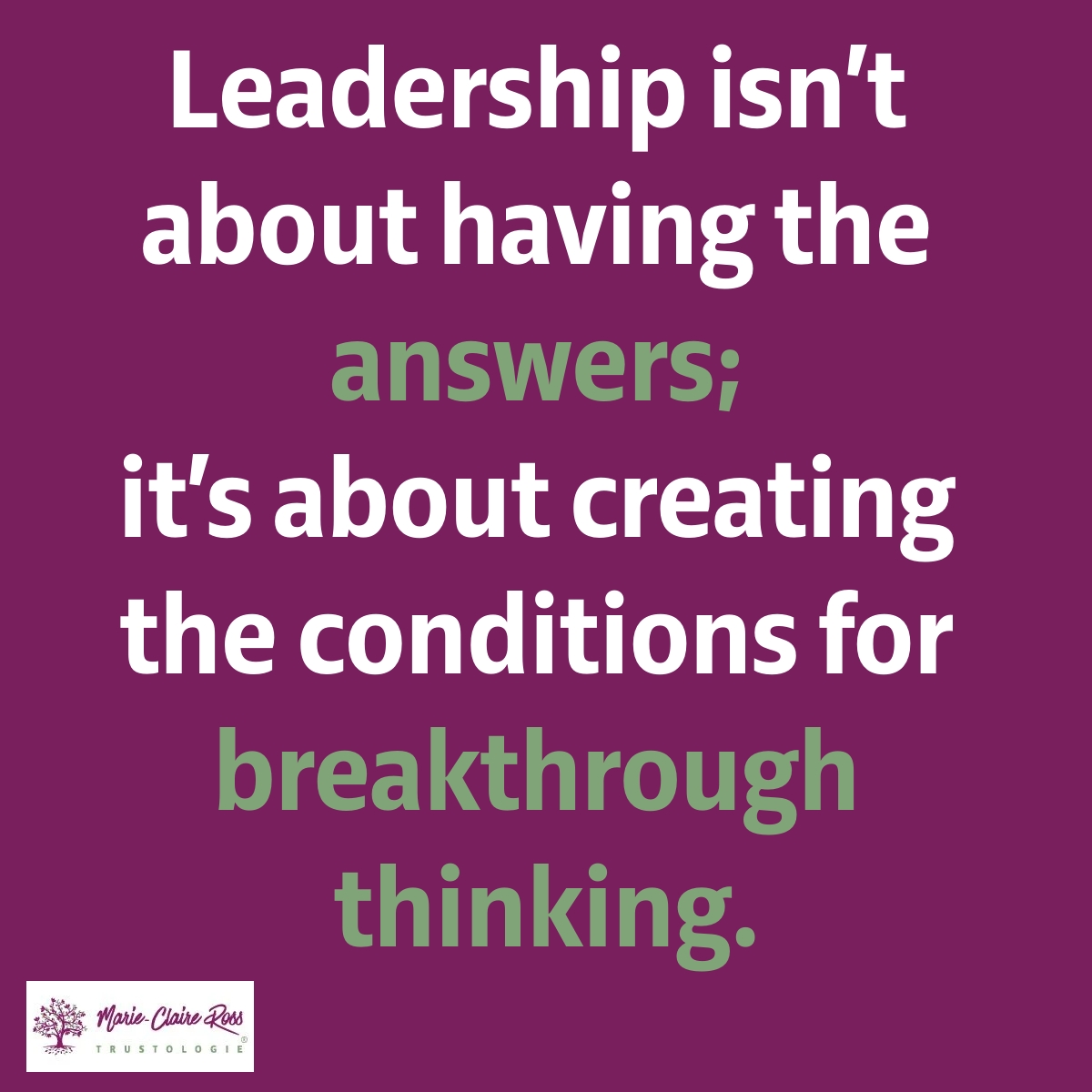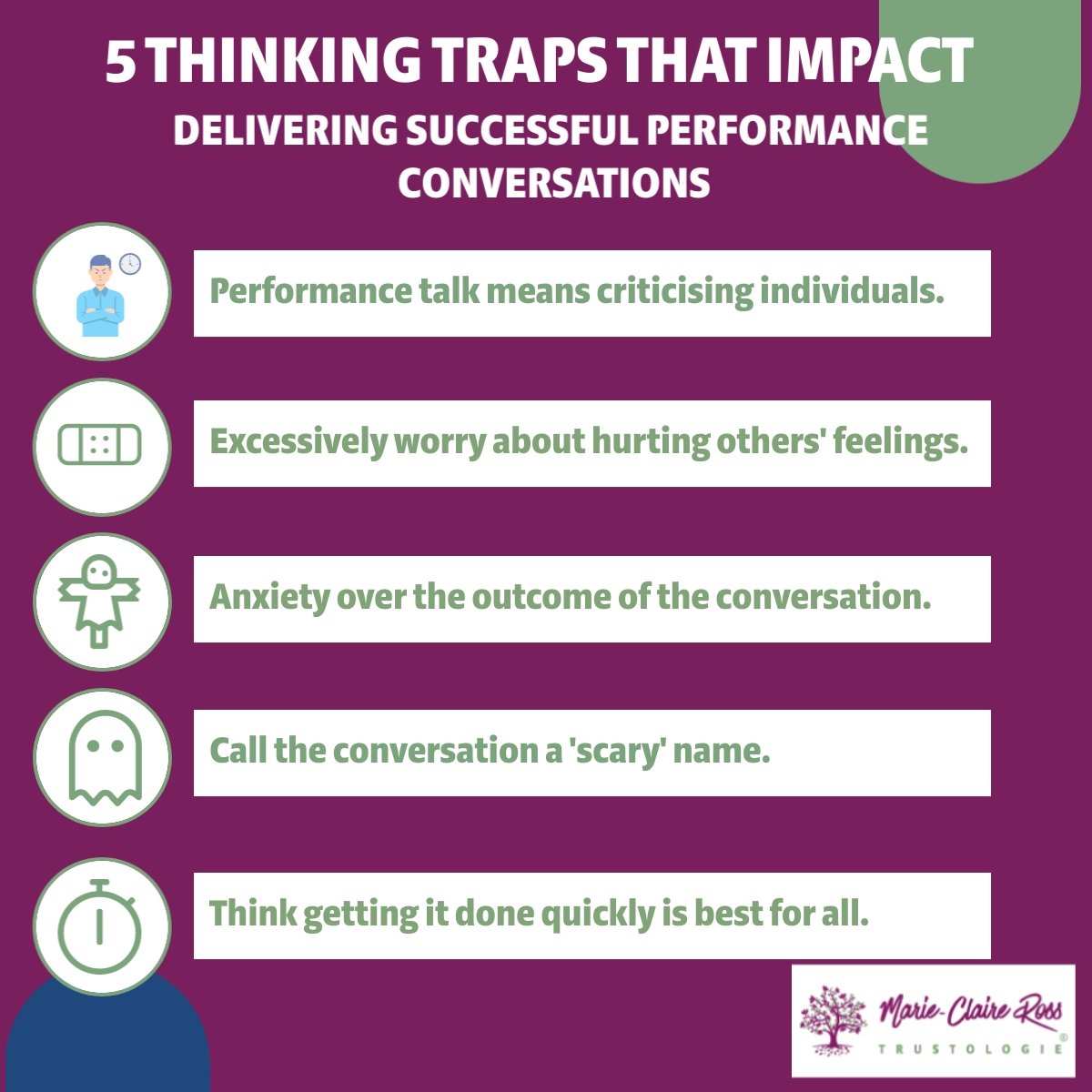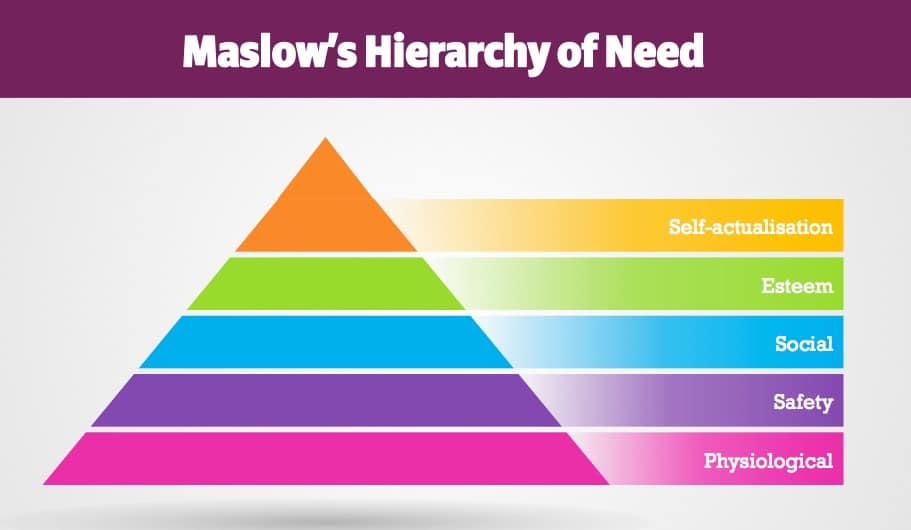8 min read
Beyond the "Why": 5 Coaching Secrets to Unlock Curiosity in Leadership
When my daughter was 17 months old, she discovered a superpower: the word “Why?”For the next two years, it was her response to almost everything.
Develop leaders, strengthen executive teams and gain deep insights with assessments designed to accelerate trust and performance.

Transform how your leaders think and perform with keynotes that spark connection, trust and high-performance cultures.

Explore practical tools, thought-leadership and resources to help you build trusted, high-performing teams.

Trustologie® is a leadership development consultancy founded by Marie-Claire Ross, specialising in helping executives and managers build high-trust, high-performing teams.

5 min read
Marie-Claire Ross : Updated on September 26, 2023

Did you know that every fifth of a second your brain is scanning the environment to make sure you are safe? We are wired to seek safety and regularly make decisions below our consciousness awareness to reduce any potential threats.
During our dealings with others, we subconsciously weigh up whether to speak up or stay silent, help others out or not, rectify an issue or not, or take on a difficult task or not.
It means we can often have an unhealthy, unproductive and irrational obsession about what people think about us that often unintentionally contributes to a lot of unnecessary anxiety. We allow our self-worth to be at the mercy of other people's opinions.
In my coaching sessions with leaders, I have found that there is one fear of working with other people that creates a lot of headaches. And that is the fear of disappointing others. Otherwise known as the FODOs.
This fear tends to appear during times of transition and change. In particular, you will find it appears when you start a new leadership role, join a new team, start a new job or welcome a new leader. You will worry about what your direct reports think about you and your boss.
The same goes with your employees. They will also worry about disappointing you if they are new, you are new or they are working on a new task.
Let's unpack some examples of when this this fear becomes prominent:
For Leaders
There are two major times when your fear of disappointing others will be heightened. They are when:
1. Starting a new leadership role - A common challenge is being part of a team to then leading the team. Particularly, when you have team mates that are older than you or have been in the team for longer than you have. It can often feel awkward to confidently make a call on an issue and have your team mates accept it. This new situation can make your previous colleagues question your decisions (and your authority). If you aren't careful, this fear of disappointing others makes you second guess yourself. You worry about your previous colleagues judging you new role as a leader and this increases your self-doubt.
In extreme examples, I often coach new leaders in these situations who have let their fear of disappointing others run rampant. The outcome is that they rarely make a decision because they are so concerned about others thinking that they are wrong. Their default is to ask their boss what to do or they tentatively ask their team to make the call. It negatively impacts their leadership and being seen as confident.
2. Changing your leadership behaviours - The FODOs will often come up when you have decided to change how you lead. This could be setting clear boundaries around availability to your team members, being more assertive with toxic behaviours or demanding more accountability from team members. When we change from being easy-going to less of a push over, it is normal for employees to push back. At this time, we need to be vigilant around any fear of disappointing others taking over and throwing us back to the old behaviours that no longer serve us, or our team.
We have to learn to no longer seek other people's approval and be firm in our own belief in our leadership abilities. It might seem easy to perform based on what other people want us to do, but it's a recipe for stress, burnout and inauthentic leadership.
For employees
There are four major times when your direct reports will be driven by a fear of disappointing others. They are when:
1. Receiving feedback - Typically, most of your employees want to please you and seek validation that you approve of their work. Yet, given that our brains regard feedback as a threat, your employees can react quite poorly to getting feedback.
In fact, their fear of disappointing you stems from the potential fact that you could fire them. It doesn't matter how big that process might be or even if you are working in an organisation that doesn't let go of people, this belief will still be at the base of the reaction. Never assume that employees believe that feedback is given in their best interest. Ensure that you explain that feedback is to help improve performance and that you are there to support their career development.
2. Learning a new task - People's performance anxiety is heightened when they are doing a new task. To reduce uncertainty, it's important to communicate really clearly and in a manner that your employee requires - rather than how you need to receive communication. This often means asking them at the end of a directive to repeat back to you what they have heard. Really anxious employees can often shut down when they are told to do something new. So you have to work with them to ensure they understand what needs to be done and why.
3. Speaking up about issues - A common reason why employees don't speak up in meetings or flag toxic behaviours from colleagues or customers is because they fear others will be disappointed over what they said. Sadly, history is littered with examples of employees speaking up about terrible (even illegal) behaviours and being told "He wouldn't do that. Are you sure that happened?"
Make sure you take complaints seriously and the wellbeing of your employees. It's these times when people are not believed that their fear of disappointing others spirals out of control. The impact to their mental health and wellbeing is enormous.
4. Working on a high stakes project - When the FODOs appear during a high stakes project, you know that you have a team member who will do anything to make the team happy. They will work weekends, long days and do everything they can to ensure a deadline is reached. I'll often hear employees say "I have to work this hard. I don't want to disappoint my colleagues."
While this is often the sign of a high performing team coming together in times of need, make sure these employees look after themselves and take time to rest after the deadline has been achieved. Otherwise, burnout and stress will be ongoing.
As a leader, it is your responsibility to create a thriving environment where everyone feels empowered to bring their best selves to work in service of a shared goal.
Yet, what can make this tricky is you.
You must embrace your true, genuine self - someone who is confident in their values and self-awareness. This will shield you from being influenced by the desire for external validation.
When you have faith in yourself and your own abilities, you lead by example. You trust yourself. You are strong in your convictions which means you are more confident in your decisions and directives. You step up into your leadership - even if it means risking the disappointment of others.
Because the reality is - when you lead from pure, positive energy that is not tainted with doubt or a lack of self belief, you act motivated because you feel motivated. You act with clarity because you feel clear.
As Dr Julia Gigani says, "You are the emotional standard to which your people calibrate. Your ability to offer the right energies to your people depends on your ability to access them within yourself."
And that positive energy is what people feel. It's not your words that they pick up on, but your positive intention and energy.
By providing a supportive and safe environment, you help employees overcome their fears and channel their energy towards achieving collective goals.
And that's where the power lies in the fear of disappointing others. It stems from a need to be with people and do something bigger than what you can do on your own. While it can be debilitating, you can turn it around so people are energised and aligned to a shared vision - working together, solving issues and knowing they are working with smart, capable people who value their contribution.
By understanding and acknowledging our team members' FODOs, we can tap into their desire to perform well and exceed expectations.
Remember, building happy teams isn't just about eliminating fear altogether. It's about transforming that fear into a catalyst for growth and collaboration. When employees feel understood, valued, and supported, they become more engaged, motivated, and ultimately, happier.
Let's face it - it's much easier to get a team to work well together, when employees deeply care that their team mates are happy with their work. After all, when you have a team mate who doesn't care what their colleagues think, you have a much tougher task to turn that character trait around.
So the next time you notice an employee deeply caring about ensuring you are pleased with their work - know that this is someone you can work with and truly support their career development.

8 min read
When my daughter was 17 months old, she discovered a superpower: the word “Why?”For the next two years, it was her response to almost everything.

11 min read
I have a friend who often finds herself at the mercy of her emotions. Recently, she called me to rehash a confrontation she’d had with a group of...

9 min read
True leadership presence isn’t a performance or a set of charisma hacks; it is the felt experience of who you are being in the room. By cultivating...

Earlier this week, a devastating tornado struck Edwardsville, Illinois - killing 100 people. The death toll also included six people working in an...

If there is one thing that both new and experienced managers or leaders worry about - it's having a performance conversation.

The pace of change within most organisations is accelerating. It’s now commonplace for companies to be restructuring, changing their business model,...